The Spring 2019 Light Novel Guide
by Rebecca Silverman,
Looking over this batch of light novels, you could be forgiven for wondering if isekai will ever die. Not any time soon! The overwhelming majority of these titles fall under that heading, whether the protagonist is reborn, reincarnated, or just wanders into a restaurant. But don't worry! If that's not your thing, J-Novel Club's re-release (and retranslation!) of Shouji Gatou's Fullmetal Panic novels also come out in our covered timeframe, as does the novelization of Mamoru Hosoda's Wolf Children: Ame & Yuki film, and Cross Infinite World has an isekai parody on the way soon. And of course there are the ongoing series that we're not covering here – The Rising of the Shield Hero, My Next Life as a Villainess: All Routes Lead to Doom, and Goblin Slayer all have new volumes on the way, as does SAO: Alicization and a new Ancient Magus’ Bride supplement.
You may notice that some of the dates for our light novels don't match up with what you've already read – that's because Seven Seas is following a “digital first” model with their titles, releasing them for e-readers a couple of months before physical copies follow. We're using the physical release dates here, but be aware that if you're an e-book reader, all of Seven Seas’ titles are currently available.
April
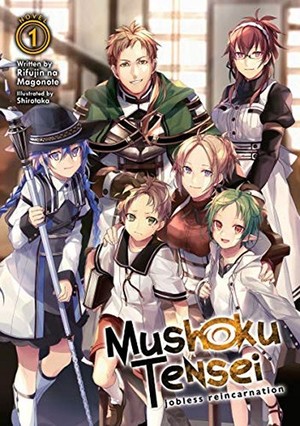 Mushoku Tensei: Jobless Reincarnation volume 1
Mushoku Tensei: Jobless Reincarnation volume 1Story by Rifujin na Magonote, art by Shirotaka. Seven Seas, $9.99 digital, $13.99 print.
Synopsis:
After being badly bullied in middle school, our protagonist became a shut-in of the worst kind, never thinking beyond his ero-games and generally embarrassing his family. Thrown out of the house at age thirty-four, he tries to save a group of high schoolers and is promptly killed by a truck. The next thing he knows, he's an infant named Rudeus Grayrat in a world of swords and sorcery. Realizing that he's been given the chance to change and get life right this time, Rudy determines that he's going to do his best at his second life.
Thoughts:
It's always interesting to read the source material for a previously released adaptation, and in the case of Musouku Tensei: Jobless Reincarnation, the original novel is a step up from the manga. Mostly this is because the novel format allows for more description of the world Rudy finds himself reborn into, as well as a few different points of view in the narration. The writing regretfully isn't good enough to really distinguish between Rudy's, Paul's, Zenith's, and Lilia's actual voices, but it does make for a more expansive world than we might otherwise have gotten. Given that Rudy himself is constantly reminding us that he's basically a thirty-four-year-old man in a small child's body and that the world he's in is new to him, this also allows for us to see the world through the eyes of people who never give the fact that they're living there a second thought. That this is largely accomplished without tedious info-dumping or resorting to RPG conventions also sets the novel apart from other similar works in its genre.
Unfortunately it does have some very off-putting elements as well. Paul, Rudy's father, is fairly unlikable (as is Lilia in at least one instance), and Rudy's smarter-than-thou attitude can grate as well. There are also some odd moments of sexuality that don't quite work with the story; it's not that Rudy shouldn't notice what his parents are doing in their bedroom or that he should be totally devoid of any interest, but rather that it feels like the author just sort of stuck those bits in for prurient purposes or to be more in line with other light novel elements. Now that Rudy is out of the house, that may change going forward, but even if it doesn't, this feels like a solid isekai story genre fans should enjoy.
May
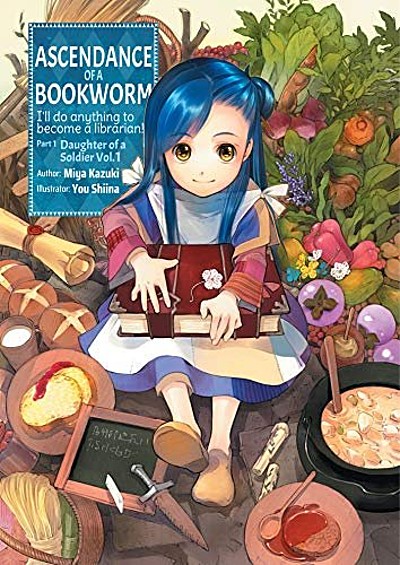 Ascendance of a Bookworm: Daughter of a Soldier Part 1
Ascendance of a Bookworm: Daughter of a Soldier Part 1Story by Miya Kazuki, art by You Shiina. J-Novel Club, $6.99. Digital
Synopsis:
Urano is a book-obsessed college student who has just landed her dream job at a university library when she's crushed to death by her book collection in a relatively minor earthquake. The next thing she knows, she's a small, sickly little girl in a Medieval world – and as we all know, Medieval Europe wasn't big on literacy or affordable books. Horrified by her new life, Myne (as she's now called) sets out to learn to make her own books, something which proves much more difficult than she ever expected. Is she really in another world, or is this just some sort of personalized hell?
Thoughts:
If there was ever a protagonist I could empathize with, it's probably socially anxious Fanny Price from Jane Austen's Mansfield Park. But Myne from Ascendance of a Bookworm is definitely a close second. Totally devoted to surrounding herself with books, Myne is aghast when she dies and is more-or-less reborn in a Medieval world with low literacy and no pulp-based paper source, meaning that her days of reading are essentially done. That certainly sounds like a nightmare situation, but the first three-quarters of the book are marred by the fact that for an avid reader with precise knowledge of antique writing practices and an almost-college graduate, Myne is astoundingly ignorant about the Medieval European-style world she's been reborn into. As she notes numerous aspects of life in the (European) middle ages, and clearly is able to place them in that time frame, she doesn't understand what her family's financial and social status, not to mention the level of technology, means for the publishing industry – as in, it doesn't exist. It's wildly out of sync with the rest of her character, and it feels like Miya Kazuki made her deliberately ignorant of that one very specific thing in order to force the plot along, possibly for “humor” purposes. If you're less of a history nerd/snob than I am, this is probably not going to be as big an issue for you, but it made Myne annoying to me as a reader and detracted from the first three-quarters of the novel overall.
Fortunately once Myne starts to acclimate to her new life a bit more, things improve. The two short stories at the end of the book are particularly strong in terms of world-building, but seeing Myne begin to use her adult and modern knowledge in pursuit of making her dreams overall come true instead of focusing on something relatively small does a lot to make the plot work better. The hints of magic that begin to surface towards the end are also interesting, as is the fact that it isn't so much that Myne was “reborn” but instead took over the body of a dead girl, the original Myne. There are some very intriguing concepts that surface in the final quarter of the novel that do make me want to give this a second chance, and now that Kazuki seems to be getting to an actual starting point for the overall plot, this really stands to become more engaging. That might make the sloggier parts of this book worthwhile.
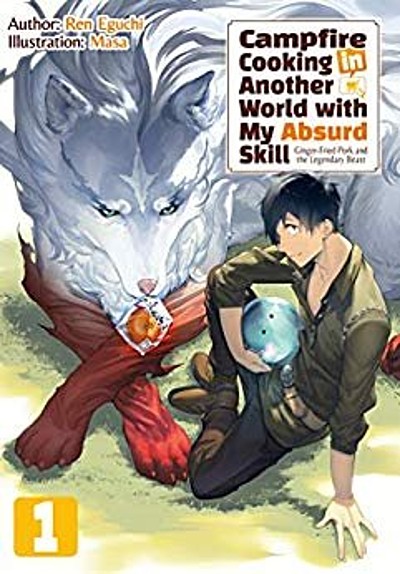
Campfire Cooking in Another World with my Absurd Skill volume 1
Story by Ren Eguchi, art by Masa. J-Novel Club, $6.99. Digital.
Synopsis:
Tsuyoshi Mukouda is just a regular old twenty-seven-year-old salary man who enjoys cooking and reading web novels in his free time when he gets swept up in a summoning ritual and ends up in another world…as a random add-on to the three summoned heroes. Quickly realizing that he's not in a great position, he takes some cash from the king and gets out of there, deciding he's probably safer on his own. As it turns out, he's going to be just fine – the only special skill he got when summoned, “Online Supermarket,” turns out to be a godsend, as it allows him to order anything carried by a Japanese online retailer for instant magical transportation. And if his weird otherworldly food gets him the patronage of a goddess and a super powerful familiar, well…so much the better! Probably, anyway…
Review:
The “absurd” in this light novel's title doesn't refer to the fact that our hero's bonus for being summoned to another world is “absurdly powerful.” It means that it's totally bizarre. Ren Eguchi's work has its tongue pretty firmly in cheek as it gives us the tale of a poor schlub who somehow got caught up when another world's king summons the usual batch of teenage heroes, only to figure out that he's not only not wanted (especially since nobody knows what his skill means), but that there's something seriously shady about the kingdom that summoned them, and so basically tells them that he'll get out of their hair for the price of a few months’ living. Fortunately he's an avid consumer of web novels, so he has a decent idea of what's going on, so he quickly changes the pronunciation of his name (to Mukohda) to sound less Japanese and strikes out on his own, magical online grocery store powers and all.
What really works about this book is the way that it plays with the hero's basic knowledge and expectations of isekai stories without being too heavy-handed. Mukohda quickly attracts a powerful magical familiar – because it's basically a big dog and it wants to eat a lot. He gains the protection of a slightly flaky goddess – because she has a sweet tooth and has zero interest in him except for the pastry he can give her. He's got only slightly-better-than-average fighting skills (and no interest in using them), a basic knowledge of cooking, and a desire to just find a good way to work with what he's got where he's landed. He's probably the most low-key summoned character I've ever encountered, and it makes the story work as both a light parody and a decent isekai story in its own right. As with other cooking-based works, there are a lot of excessively descriptive passages about cooking and flavors, but if that's not your thing, it's easily skipped, as are the traditional RPG stat screens, so even if those elements you're tired of, this is still a book worth giving a read.
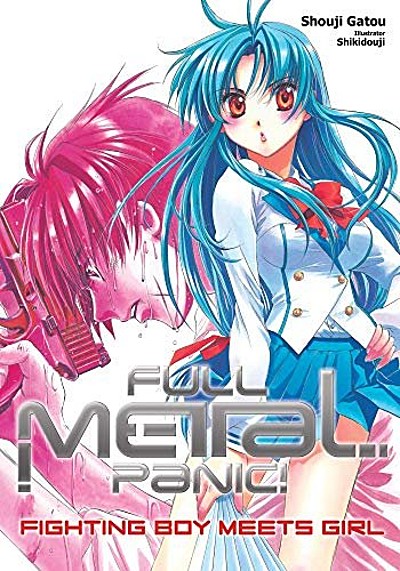
Full Metal Panic volume 1
Story by Shouji Gatou, Art by Shikidouji. J-Novel Club, $6.99. Digital.
Synopsis:
Sagara Sousuke is the ultimate soldier despite only being in his late teens. A former child soldier, he has spent his entire life fighting, and is now a member of the secretive elite private force Mithril. Now he's about to embark on the most difficult mission of his life: entering a Japanese high school to protect a girl his own age. Chidori Kaname is a “Whispered,” a person with a very specific gift that makes her attractive to terrorists around the world, and Sousuke's mission is to prevent them from getting their hands on her. But high school is nothing like the kind of battlefield he's known – will he be able to win this fight, or will everyday life bring him down?
Thoughts:
Even if you read this novel when Tokyopop released it years ago, it's absolutely worth revisiting J-Novel Club's new translation. Not only is it a smoother, easier read, but it also is just a genuinely good story, the kind where you can enjoy it on as a re-read just as much as the first time. What's particularly striking about this translation is how natural it sounds, particularly when the characters are talking to each other. Yes, if you're a nit-picky language person there is something a little weird about them using contemporary slang when the text talks about the USSR and the KGB, but ultimately the plot's strong enough that it doesn't matter. The story itself is a nice mix of military action, character work, and lighter high school hijinks, that last primarily resulting from Sousuke completely failing to understand the nuances of social interactions or social norms. This does make for a heartbreaking moment in the final quarter of the book when he realizes that Kaname is afraid of him when he's in super-soldier mode – previously he hadn't considered that A) he might be seen as other than a protector and B) he'd really like her to like him. To her credit, Kaname is astute enough to realize what's going on, even if Sousuke can't always read her clues, and the result is that the volume starts building their relationship in an organic, believable way that nicely balances the military jargon and some of the harsher action scenes. Honestly, this is just a good book, one well-written (and translated) enough to take it out of light novel reading circles, and it's absolutely worth picking (back) up.
 The Greatest Magicmaster's Retirement Plan volume 1
The Greatest Magicmaster's Retirement Plan volume 1
Story by Izushiro, art by Ruria Miyuki. J-Novel Club, $6.99. Digital
Synopsis:
At age sixteen, Alus has risen to become the greatest magicmaster in the world – and after having been conscripted into the military due to his power and spending the last ten years fighting the monsters known as fiends, he's ready to retire. The military, however, doesn't want to let their best asset go so easily, so instead of allowing his legally-supported retirement, they promise him access to the best research materials and the time to conduct his own research on the condition that he'll come back if called. The catch? Those materials are at a school, and Alus has just been enrolled.
Review:
While I can see what the intent is behind The Greatest Magicmaster's Retirement Plan, that doesn't stop the story itself from coming off as somewhat cruel. Alus, our protagonist, was scooped up by the military at age six due to his amazing amounts of mana and skill in using it, and basically spent his childhood on the battlefield, trying to reclaim land from fiends for humanity. Then, when he points out that he's allowed to retire after ten years’ service and that he'd really like to do so, the top brass refuses to let him – essentially they'd rather continue to abuse a child than to let him walk free. The so-called “compromise” they offer him is one rife with ulterior motives – not only will he have to return when they call him, but he'll also have to attend a school for budding magicmasters, with the stated (albeit not to him) hope that he'll form bonds that will renew his will to fight, because now he'll want to protect his friends/harem. It's a pretty raw deal for Alus, even if it probably wouldn't hurt him to learn how to be a sixteen-year-old kid. It's then compounded by one of the most irritating female casts I've personally encountered; each member of Alus’ harem is either too sweet for consumption (Alice), way too angry all the time (Fia), manipulative (the principal), or severely lacking in personality (Loki). They're all extremes of their archetypes, and while there's no rule that tropes can't be well used to develop interesting characters, that doesn't appear to be the case in this volume. The author tries to make everyone have a reason for their behaviors – or at least Fia and Loki – but it falls short when there are just so many annoyances in them. It might have made more sense if the plan had been to annoy Alus back onto the field of battle.
All of that said, the author's afterword does imply that they've got a plan for this, and this is their first (printed) novel, so once the kinks are ironed out, there may be more going for the series. For fantasy readers, this is just straight-up fantasy (with some AoT-influences), which is nice, even if the magic descriptions can be a bit excessive. It's not entirely without potential, and your level of dislike for the characters will likely determine if you want to stick around to find out if it fulfills it.
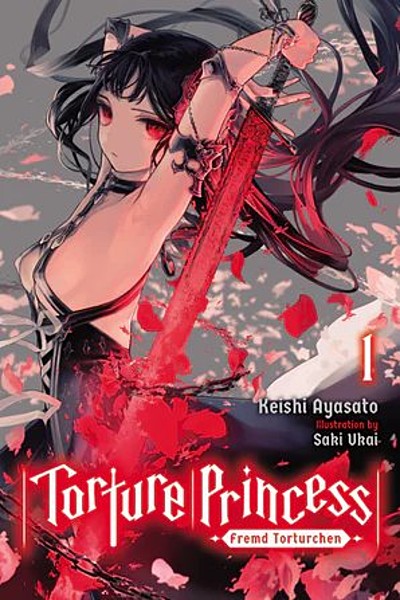
Torture Princess volume 1
Story by Keishi Ayasato, Art by Saki Vkai. YenOn, $14. Print and Digital.
Synopsis:
Kaito Sena's brief life was marked by extreme abuse at the hands of his father. When that life ends, he finds himself transported to another world, where he becomes the servant of Elisabeth Le Fanu, a young woman known as the Torture Princess. Elisabeth committed countless horrible crimes, and as restitution, she has been ordered to destroy the fourteen ranked demons of her world before she is executed. How did she become so evil? Is it anything Kaito can ever hope to understand?
Thoughts:
Torture Princess is a difficult book. Unlike some other similarly titled works, which often play off the “torture” for giggles (at least to a degree), this novel series’ first volume absolutely means the word in its truest sense, and that can make for some tough reading. Elisabeth, whose name seems a tribute to both the infamous “Bloody Countess” Elisabeth Bathory and Gothic novel author Sheridan Le Fanu (best known today for his lesbian vampire novella Carmilla), is a truly vile character, steeped in blood and violence. She revels in it, and really that's not what Kaito Sena needs in his new life – he was just killed by his horrifically abusive father in our world. If you're not into dark fantasy or horror that means it, this may not be the book for you. It adds to this with some very uncomfortable psychological elements, although it is clear that author Keishi Ayasato is trying to make a point about how abuse can shape your worldview. Towards the end of the novel, we learn more about Elisabeth's childhood at the hands of her own abuser, and while it doesn't excuse what she's done (and is doing), it does work as at least a token effort to help us understand that she wasn't born evil. This sets up a parallel between her and Kaito, who could easily head down her same path, as well as between Elisabeth and Kaito's father, raising the question of whether or not he was merely doing as was done to him. These chapters are easily the most intriguing of the book, although all of the descriptions of torment and abuse make for very tricky reading, and the fact that Kaito has gone from one nightmare to another is uncomfortable at best.
Long story short, Torture Princess has the potential to look at some interesting psychological issues and themes of whether or not redemption is possible. The character of Hina forms a good counterbalance to Elisabeth and the writing and translation are solid. But it is not a light read. If you want something dark and disturbing, this is your book, but if that's not your thing, I'd suggest moving along.
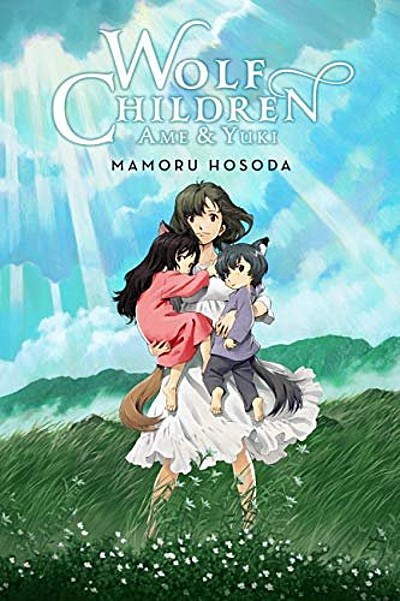
Wolf Children: Ame & Yuki
by Mamoru Hosoda, YenOn, $20. Print and Digital.
Synopsis:
Hana meets and falls in love with a werewolf and together the two of them begin a life, carefully hiding his secret. They have two children, Yuki and Ame, who share their father's characteristics, and when he dies unexpectedly, Hana decides to move to the countryside where he was from to raise them. The two children grow, learning about both halves of themselves, as Hana tries her best to eke out a living for them and to understand that children are their own people and need to have the freedom to make their own choices.
Thoughts:
Even though I have never seen the film this is a novelization of, it is easy to picture it as I read. This is an intensely visual novel, full of lush details and small but important moments that creates a fully realized film in your mind as you read. Whether this means that film is the better way to tell the story or not (and that does feel like a possibility), it still makes for an immersive reading experience, which is nothing to sneeze at.
The story itself falls under the category of “beautiful melancholy” (mono no aware). Told primarily from Hana's perspective until a little over halfway through the book, the idea of a human woman raising her half-wolf children is almost equally a metaphor for families in general and a more literal (in the genre sense) fantasy tale. The children's werewolf heritage can almost be read as a metaphor for a culturally mixed family, where the remaining parent struggles to allow her children to live both sides of their cultural heritage in a world that isn't sure that's okay. There's also a message of understanding that your family will change over time, with people making their own life choices, but that that doesn't mean that you're any less a family than when you all lived together. That's a difficult realization at times, and Hosoda handles is smoothly and sweetly in the novel. It's a reminder that “happily ever after” means something different for everyone – and that when we accept and understand that, we become a stronger family.
June
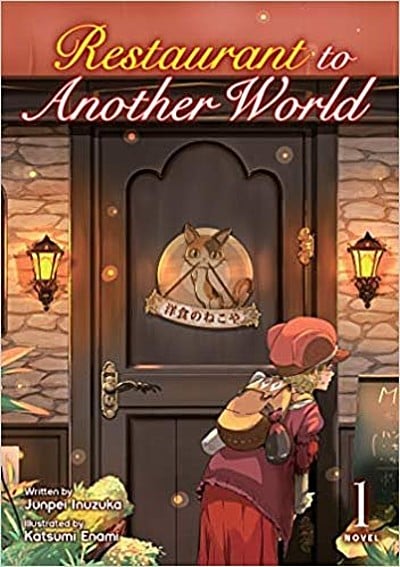 Restaurant to Another World volume 1
Restaurant to Another World volume 1Story by Junpei Inuzuka, art by Katsumi Enami. Seven Seas, $13.99 print, $9.99 digital.
Synopsis:
Behind the mysterious black wooden door with an image of a cat lies Western Cuisine Nekoya. For six days out of the week it's a perfectly normal restaurant in Tokyo, but on the seventh day doors to the eatery appear in numerous places around another world. On that day, patrons come from various kingdoms, empires, and villages, walking into Nekoya to sample to treats unavailable to them any other time. Here in Nekoya all differences and tensions are set aside (unless it's a squabble over favorite dishes) in the name of enjoying delicious food.
Thoughts:
Restaurant to Another World isn't so much a novel as it is a collection of inter-related short stories all based around the same Tokyo restaurant that once a week is open only to customers from another world. It's not an easy style to pull off, but Junpei Inuzuka largely accomplishes it, interweaving glimpses of other patrons into each character's story and building character relationships that may or may not affect the world at large. (The prince who falls in love with the foreign princess will almost certainly have real-world implications, but that's really the only one.) More importantly, each story goes to build on Inuzuka's central theme, that with good food eaten in company, tensions lighten and the world is a calmer, or at least happier, place. It's a nice thought and a peaceful theme for the book, and it really makes this a kind of before bed read, perfect for just drifting off to sleep.
The downside is that it can be a little dull at times, and every story follows the same basic set-up: person finds restaurant, picks favorite dish, waxes eloquent about eating it, vows to come back. It probably works best read a story at a time, so the sameness of it all doesn't drag down the otherwise very pleasant book. As a note to anime viewers, Aletta, the demon girl who serves as our entry point into the story in the show, doesn't come in until the last chapter of this book, which in some ways may account for the general lack of variety in each tale. But it is a pleasant read regardless, so if you don't need action and you like food, it's worth picking up.

Skeleton Knight in Another World volume 1
Story by Ennki Hakari, Art by KeG. Seven Seas, $13.99 print, $9.99 digital.
Synopsis:
A young noblewoman and her maid are viciously attacked by bandits on their way home from a function only to be saved at the last minute by a strange knight calling himself Arc. Arc, as it happens, is actually a gamer who fell asleep while playing an MMORPG, and he's not sure why he's suddenly living in the game's world as the last character he was playing. As he stumbles along figuring out the differences between the game and reality (and the fact that he's super overpowered), Arc ends up getting embroiled in the political situation that spawned the attack on the young women – and has much longer arms than anyone ever imagined.
Thoughts:
There honestly isn't much that makes Skeleton Knight in Another World stand out from almost any other light novel in its particular isekai subgenre. If it were interesting and well-written, that wouldn't be so much of a problem, but this is as by-the-numbers as you get. Gamer transported into RPG world? Check. Saving a series of beautiful women? You got it. Lengthy descriptions of the game world and how it differs ever-so-slightly from the game? Done. It's bog-standard stuff. Ennki Hakari even treads on a few of the more dangerous routes that this sort of story can travel, such as the extreme violence and very-near rape of two of the female characters, as well as a plot thread about how the bad guys are enslaving elf women. Although this are unpleasant elements in the story, it should be mentioned that the slavery is not ever considered anything but bad and the rape is not written to be titillating – major points in the book's favor. There's clear room to improve in future volumes, as well. The political situation is tense and no one of the characters seems to truly understand how deep it goes, so this may very well be one of those series where the first volume is the author doing what needs to be done in order to get published and will then move the story into more interesting directions. This book will be a bit of a slog if you're not a fan of its subgenre, though, because all the potential in the world can't quite make it an interesting read.
August
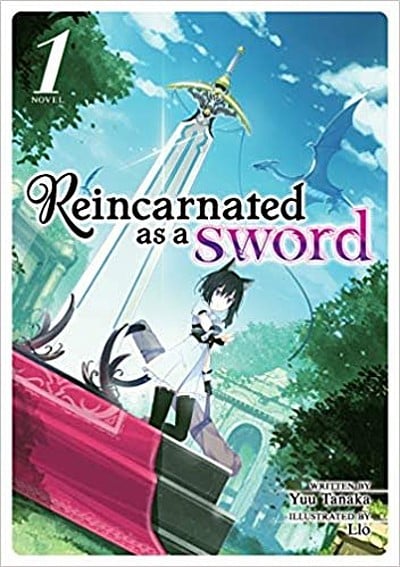 Reincarnated as a Sword volume 1
Reincarnated as a Sword volume 1Story by Yuu Tanaka, art by Llo. Seven Seas, $13.99 print, $9.99 digital.
Synopsis:
One minute a distracted driver in a sports car is charging towards him, the next a thirty-year-old man is waking up to find that he's a sword. It's a strange new life, but not without its benefits, since he's an Intelligent Blade, capable of telekinesis, magecraft, and telepathic communication, among other things. He's taken up by Fran, a young cat-girl slave, and he helps her to free herself from the men planning on selling her, and then together the two begin making a name for her as a powerful adventurer. If you've got to be reborn as an object, this is the way to go!
Thoughts:
Reincarnated as a Sword, like its similarly titled counterpart Reincarnated as a Slime, is much more enjoyable than you might at first assume. Told entirely from the perspective of a salaryman run down by Truck-kun's little sister Sports Car-chan and reborn as a magical blade, the book maintains a decent balance of action, self-referential humor, and a very nice father-daughter relationship between the sword (eventually named Teacher) and Fran, the twelve-year-old who picks him up. Given that he's an actual sword, we can take what Teacher says about feeling fatherly towards the orphaned cat-girl as the truth, and his thoughts and actions support that – he worries about her eating properly, getting a good night's sleep, and all the other little parental details with barely a comment about her appearance except to note when she needs new clothes. Fran herself isn't terribly well developed, but she's well within her rights to be quiet and aloof – after being orphaned, she was taken by slave traders and has spent most of her childhood as a slave before meeting Teacher. If she's not great with trust or being taken care of, she has a right to be.
The major issue with the novel is the over-reliance on the RPG-stylings of many similar fantasy light novels. There's excessive amounts of level information, skill lists, and explanations of both of them, and it's not just how Teacher is able to understand his new world – everyone can call up similar menus. It's a tired old trick by this point, and the author definitely relies upon it more heavily than many other recent novels. Lines like “What kind of bad light novel is this?” help smooth things over, but the writing in general feels pretty uneven. Still, if you like bloody action and cute parent/child relationships without subtext, this is feeling like a pretty safe bet for getting both of those in a single place.
discuss this in the forum (10 posts) |